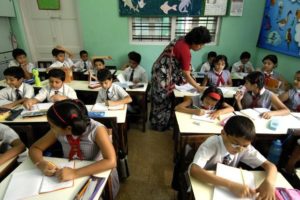The 21st century is certainly the age of reason. Information overflows from all corners and competition has increased as the global village comes closer. India’s teachers are positioned with a unique opportunity to shape the lives of young minds forever.
Today we see more and more youngsters becoming innovative, rational, and argumentative, which is a sign of a society in transition. We have originated from the gurukul system of education, into an ever, ever land today. The task that lies before a teacher now is how to act as a catalyst in the realization of a young Indian dream. I have always believed that academic excellence must go hand in hand with moral development. The teacher must be able to inspire creativity into the minds of students. For this to happen, teachers must first be free, their schedule more flexible, their social security more inclusive and their ambitions even higher. Educational boards ought to reform mundane guidelines and enable teachers to bridge the transition from the classroom to the real world.

Education is the one powerful tool which can impact the way India functions, flourishes and grows. The teachers have the potential to create students, who not only rise up and shine in life, but who can also become the world’s envy, but as a system, we need to invest in teachers.
Teachers are the first soldiers of democracy and debate, of research and development, of faith and reason. It is upon them, that the honour of India remains and it is on them that the wisdom of young minds enables the necessary changes required into the dynamics of our nation, putting it not only on market savvy listings but where other civilizations come here to explore the majesty called Hindustan.
Schooling and education are two different things, although some may like to call it two sides of the same coin. Just because a person has gone to school does not make the individual responsible, tolerant and principled. Education must instil in students, a value for life, and value for principles, integrity and service as well. Teacher’s play a very crucial role where understanding children as independent and different individuals become important. Every child learns differently and assessing their abilities and needs, as also their circumstances in which they rise and grow becomes imperative. Many times, teachers are not well trained in assessment needs; they do not know how to handle passionate children and how to interpret guidelines.
The first step to bringing a revolutionary shift is for teachers of different institutes to come together and dialogue the problems they face, the challenges that exist and to identify solutions. Teachers belonging to government and private schools, must be sent for exchange programmes abroad, must be exposed to leadership programmes and must be trained how to interpret guidelines issued from time to time from education regulatory boards.
We need to bring value to our classrooms, not just manufacture a bunch of students who may or may not be grateful. While we do this, it is primarily essential that teachers get the flexibility they deserve. Only in India do passionate teachers not get equivalent pay-scales and promotions which is rightly theirs, they do not get training in premiere institutes abroad, do not have the resources to conduct research and development activities, have to compromise and work within crumbling infrastructures which need to be rebuilt.
Many teachers are party to voting that happens during the Legislative Council Elections (Vidhan Parishad) in few states. It is also their moral duty to vote for candidates and not parties during such election. If teachers keep aside their conscience and vote for parties, what inherent example do they set before their own students? There are also claims made that teachers solicit monetary benefits during elections. If India’s teachers can rise up and be the change themselves, by supporting young candidates with a sound background and a clean image with capability to change the way we look at education and bring in collaboration and create networking opportunities for them, a democratic process of change will be born that day.
A new together will emerge from then on, where the representative understands the voices of the teachers and echoes their sentiments in public spheres, safeguards their rights and also brings more responsibility and accountability into the classrooms.
With the incoming and growing tide of tutorial classrooms as a way of life for young minds, let us begin to cultivate teachers who can connect to the social and circumstantial determinants of education and empower them to bridge the widening gulf of the classrooms. History will record that changing textbooks, burdening them with tests, suppressing voices are experiments which have taught us many things, but we have now come to a realization that investing in professional development for teachers will lead the way forward. Once teachers are able to training students to form opinions, think critically and offer solutions, it will be India’s moment of opportunity won. Producing thinkers remains the corner-stone of creative teaching.
We witness so many instances of socio-political brain-wash taking place at schools, colleges, universities and so often find that students do not have an opinion of their own, they are unable to reason and think, why certain incidences happen, and are absolutely unwilling to dig deep into the truth. No country can survive and thrive by poisoning young minds and dividing them on the basis of religion, caste and creed. Students must be trained to take decisions, whether it is in their professional spheres, in their personal lives or otherwise. That’s when we will be able to evolve as a society, that is when India’s teachers would have won. Can we perhaps make a beginning? Jai Hind. #IndiasTeachers